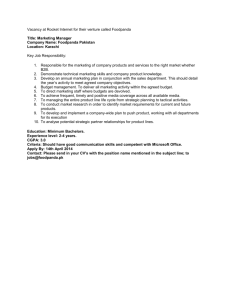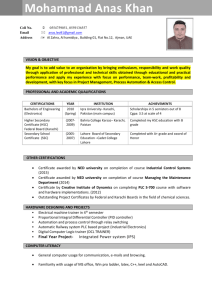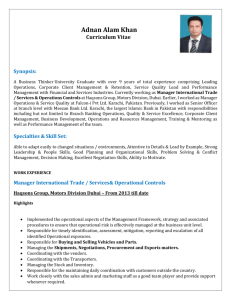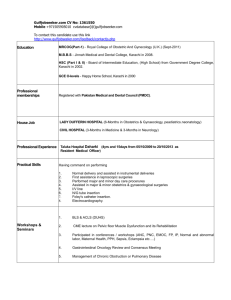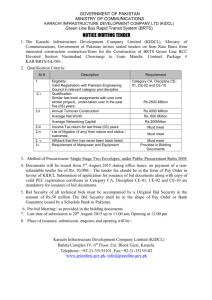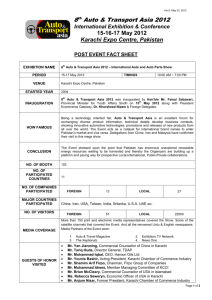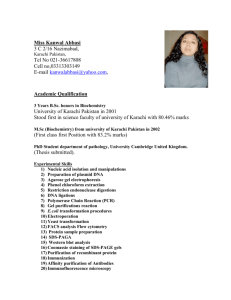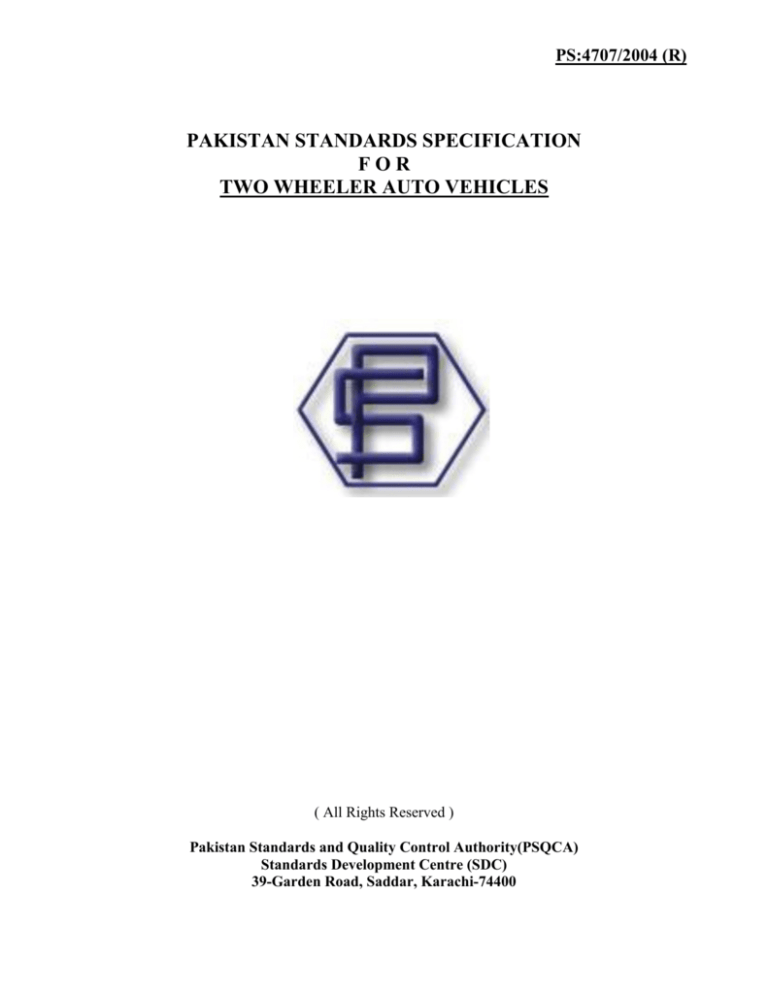
PS:4707/2004 (R)
PAKISTAN STANDARDS SPECIFICATION
FOR
TWO WHEELER AUTO VEHICLES
( All Rights Reserved )
Pakistan Standards and Quality Control Authority(PSQCA)
Standards Development Centre (SDC)
39-Garden Road, Saddar, Karachi-74400
2
PS:4707 / 2004 (R)
TWO WHEELER AUTO VEHICLES
S.#
CONTENTS
PAGE #
1.
Foreword
1
2.
3.
Scope
Definitions
2
2
4.
Emission
3
5.
Requirements for Emission
4
6.
Table - 1
4
7.
Marking & Labelling
5
8.
Sampling & Criteria of conformity for production conformity 5
Test
9.
Testing
5
10.
Table-2
6
3
PS:4707/2004 ( R)
PAKISTAN STANDARDS SPECIFICATION
FOR
TWO WHEELER AUTO VEHICLES
MEMBER LIST OF SECTIONAL COMMITTEE
FOR PRIME MOVERS.
Chairman
Engr. Syed Ali H . Naqvi,
Dy. General Manager,
M/s. Karachi Shipyard & Engineering Works (Pvt) Ltd.
Karachi.
Participants
1.
Mr. M. Yamin Khan,
DIG Traffic,
Sindh Police,
Karachi.
2.
Director,
Industries,
Government of Sindh,
Karachi.
3.
Engr. S. H. H. Bukhari,
Dy.Chief Engineer,
ATC Manora Marine Work shop,
K.P.T. Karachi.
4.
Mr. Noor-ul-Haq Kakar
Secretary District Regional Transport Authority
Quetta, Balochistant.
5.
Chairman,
Mechanical Engg. Department,
NED University of Engg. & Technology,
Karachi.
6.
Mr. Asif Farid
General Manager,
Automatic Testing & Training Centre Ltd.,
Karachi.
7.
Engr. Shoukat Ali Khawaja,
Manager (Tech),
Pakistan Machine Tool Factory
4
8.
Landhi, Karachi.
Mr. Tanveer Ahmed Siddiqui
Jr. Executive (Quality Control Department)
Sindh Engineering (Pvt) limited,
Dockyard Road, West Wharf,
Karachi.
9.
Mr. Midhat Azim Kidwai
Chief Executive officer,
M/s. Suzuki Motorcycles Pakistan Ltd.,
Karachi.
10.
Mr. Yunus Dawood,
Chief Executive,
M/s. Dawood Yamaha Limited,
Karachi.
11.
Mr. Maqsood Ahmed Basra
General manager,
M/s. Atlas Honda Limited
Sheikhupura Road, Lahore.
12.
Mr. Saeed Ahmed Khan,
Chief Commercial Manager
P.C.I.C.S., Limited (Sohrab Motorcycle)
Lahore.
13.
Engr. Muhammad Siddiqui,
Deputy Manager,
Pak. Suzuki Motor Company
14.
Mr. Rana Abdul Qayyoum,
M/s. Miraj Auto,
Lahore.
15.
Mr. Mohammad Farooq Bhatti,
M/s. Blue Star Automobile,
S.I.E.
Kohat.
16.
Dr. Naeem
M/s. Memon Associate
Hyderabad.
17.
Mr. Riaz Ahmed,
Manager,
M/s. Supper Star Auto Rickshaw and Motorcycle,
Lahore.
5
18.
Mr. Haroon
Pak. Star Enterprises (Pvt) Ltd.,
21-Ajmer Market,
Karachi.
19.
Mr. M. Arshad Siddiqui
Manager project,
M/s. Atlas Honda limited.,
Karachi.
20.
Syed Adnan Azam,
Manager Sind Region,
M/s. Pak. Hero Ind. (Pvt) Limitesd,
Karachi.
21.
Mr. Amjad Ali,
M/s. Tiger Auto Industry,
27-S, Industrial Area, Kot Lakhpat,
Lahore.
22.
Mr. Ismail,
M/s. Pak. Star Enterprises.
Karachi
23.
Dr. M. A. Damani.
Ex-Officio
Director General,
Pakistan Standards and Quality Control Authority,
Karachi.
24.
Mr. Abdul Rauf Khan Kirmani,
Director,
Standard Development Centre
Karachi.
Secretariat
1.
Mr. Abdul Haseeb Qureshi,
Deputy Director,
Standard Development Centre
Karachi.
2.
Engr. Kamaluddin Mangnejo,
Asstt. Director Mechanical,
Standard Development Centre
Karachi.
3.
Mr. Fahim Bari,
Dy. Assistant Director Mechanical,
Standard Development Centre,
Karachi.
Ex-Officio
Secretary
6
PS:4707/2004 ( R )
PAKISTAN STANDARDS SPECIFICATION
FOR
TWO WHEELER AUTO VEHICLES
0.
FOREWORD:
0.1
This Pakistan Standard was adopted by the authority of the Board of Directors for Pakistan
Standards & Quality Control Authority after the draft prepared by the Sectional Committee
for “Prime Movers” (MDC-13) was approved and endorsed by the Mechanical Engineering
Divisional Council on _______________.
0.2
This Pakistan Standard has been prepared after taking assistance, from the following Pakistan
Standards, Japanese Standards, Canadian Standards, Thai Industrial Standard &
Environmental Protection Agency (EPA) regulation which is acknowledged with thanks.
0.3
i.
PS: 4710-2001 Mopeds and motorcycles with two wheels – Masses- Vocabulary.
ii.
PS: 4711-2001 Motorcycles – Measurement of maximum speed.
iii.
PS: 4712-2001
Motorcycles-Brakes and braking devices- tests and
measurement methods.
iv.
PS: 4713-2001 Three Wheeled mopeds and motorcycles- Masses – Vocabulary
v.
PS: 4714-2001 Two-Wheeled Motorcycles – Parking Stability of side- and
Center-Stands.
vi.
JIS D 5302/97 Lead –Acid Batteries for Motor cycles.
vii.
Canadian Document
(standard 1100)
viii.
TIS: 1105-2535 (1992) Motorcycles: Safety requirements.
ix.
EPA – SRO No. 742(1)/93. (Emission Standard)
Motor vehicle safety regulations- Vehicle Emission
This Pakistan Standard was first prepared in 2001 by the special committee (created for
formulation of standards on 2 / 3 wheeler auto vehicles). Now keeping in view the latest
development for accommodating the two and four stroke engines and minimizing the
environmental pollution for these engines and economizing the use of motorcycle, this
standard is revised.
0.4
1.
7
This standard is subject to periodical
review in order to keep pace with
developments in technologies. Any suggestion for improvement will be recorded and placed
before the concerned committee in due course.
Scope
This Standard specifies the requirements for Two Wheeler Auto Vehicles (Motorcycles).
1.1
This standard specifies requirements, marking, labeling, sampling and criteria for
conformity.
1.2
This standard covers only motorcycles with an unladen mass of less than 400 kg, a
maximum designed speed exceeding 40 km per hour and cylinder capacity up to 150 cc.
1.3
This standard covers safety requirements and limitation of emission of gaseous pollutants.
2.
Definitions
For the purpose of this standard the following definitions apply.
i
Two Wheeler Auto vehicle (Motorcycle): Motorcycle means a vehicle that has a head lamp,
tail lamp, stop lamp and two wheels and a kerb mass of less than or equal to 680 Kg. It does
not include a restricted – used motorcycle, a competition vehicle, and all – terrain vehicle, a
vehicle that has an engine displacement of less than 50 cm3 (3.1 cubic inches) or a vehicle
that, with an 80 kg driver, can not
(a)
(b)
start from a dead stop using only the engine, or
exceed a speed of 40 km/hour (25m.p.h.) on a level paved surface.
ii.
Type: Motorcycles of the same mark-maker, having the same type of engine and gear,
assembled on the same main assembly jig.
iii.
Braking system and components
(a)
Braking System: Combination of parts (other than the engine) the function of which
is progressively to reduce the speed of a moving motorcycle, bring it to a halt and keep
it stationary if it is already halted, consisting of
-
The control.
The transmissions;
The brake(s).
(b)
Control: Part operated directly by the rider to supply to the transmission the energy
required for braking or controlling the motorcycle.
(c)
Transmission: Combination of components which provide the functional link
between the control and brake.
(d)
Brake: Parts of the braking system in which the forces opposing
the movement of the motorcycle are developed.
8
iv.
Types of braking systems
(a)
Independent braking system
In the case of motorcycles (with an engine cylinder capacity exceeding 50 cc or a
design speed exceeding 50 km / hour) system which acts on only one wheel.
(b)
Combined braking system
In the case of motorcycle (with an engine cylinder capacity exceeding 50 cc or a
design speed exceeding 50 km / hour) system whereby at least two brakes on
different wheels are actuated by the operation of a single control.
v.
vi.
Parking stand
(a)
Side stand:
Retractable device which supports a stationary two wheeled
motorcycle by leaving both tyres in contact with the parking surface and providing a
third contact area with the parking surface on only one side of the vehicle
longitudinal plane.
(b)
Centre / Main-stand: Retractable device which supports a stationary two wheeled
motorcycle by providing two or more contact areas between the stand and parking
surface. With at least one contact area on each side of the vehicle longitudinal plane.
The center-stand may support the motorcycle entirely or in conjunction
with one or both tyres.
Lead – acid batteries for motorcycles: A battery intended to be mounted on a
motorcycle for the power source of starting, lighting, ignition, etc.
The battery having such function resulted from its construction that supplement of
water is not necessary because the oxygen gas generated from the positive plate react
to and absorbed in the negative plate is called “sealed type battery”, and other
batteries than this are classified as “vented type battery”.
Further, that battery of which high rate discharge characteristics have been improved
by using the separators of lower resistance than that of conventional one among the
vented type batteries is called “high performance type battery”, and the battery other
than this one is called “normal type battery”.
3.
EMISSION
3.1.
Emission From Engine:
Hydrocarbons, carbon-monoxide, and oxides of nitrogen in
addition to the sound emitted from motorcycles.
3.2
Hydrocarbons:
Hydrocarbon compounds derived from non-combustion or incomplete
combustion of fuel in the engine.
9
3.3
Carbon-monoxide: Carbon-monoxide resulting from incomplete combustion in the
engine.
3.4
Oxides of Nitrogen: Compounds of nitrogen and oxygen resulting from combustion in the
engine.
3.5
“Sound level” means the root-mean-square of the values measured in dBA that are
recorded during testing.
3.5.1
“dBA” means the A-weighted sound level in decibels, measured using a sound level meter.
3.5.2
“decibel” or “dB” means 20 times the logarithm to the base 10 of the ratio of the measured
sound pressure relative to a reference sound pressure of 20 mPa.
3.6
“rated engine speed” or “maximum rated engine speed” means the rotational speed of an
engine in revolutions per minute (RPM) at which the maximum horsepower of the engine is
attained. ( maximum rated engine speed ).
4.
REQUIREMENTS FOR EMISSION
4.1
The following requirements for emission shall be met
Table-1
Quality Standard for vehicle exhaust and noise
S. No.
Parameter
Standard (maximum permissible
limit)
40 % or 2 on the Ringlmann
scale during engine acceleration
more.
1.
Smoke
2.
Carbon
Monoxide
Emission Standards
New Vehicle
Used Vehicle
4.5 %
* 6%
3.
Noise
85 dBA
* shall not be applicable in the case of licensing process.
Measuring
To be compared
with Ringlmann
chart at and
distance of 6
meters or more
Under idling
condition: Nondispersive infrared
detection through
gas analyzer.
Sound-meter at 7.5
meters from the
source.
10
5.
Marking and labelling
5.1
At least there shall be affixed, legibly, clearly and permanently, to any part of the engine of
every motorcycle, number, letter or mark representing the model of the engine
corresponding to the motorcycle.
5.2
Any person who manufactures products complying with this standard may use the PS Mark
in connection with his products only after having received a license from the Pakistan
Standard and Quality Control Authority.
6.
Sampling and criteria of conformity for production conformity test
6.1
Lot: Motorcycles of the same type as those previously deemed to comply with this
standard which are manufactured or delivered or purchased at the same time, not to exceed
5000 in number.
6.1.2
Sampling
Three sample shall be drawn at random from the lot.
7.
Testing
7.1
General Requirements
7.1.1
All analytical equipment shall have an accuracy of measurement to within + 3 %. The flame
ionization analyzer for hydrocarbon determination shall be capable of reaching 90 % of full
scale in less than 1 second.
7.1.2
The content of the test and calibration gases shall not differ by more than + 2 % from the
reference value of each gas. The diluent shall be nitrogen.
7.2
Test condition
7.2.1
The temperature in the test room shall be maintained between 20oC throughout the test.
7.2.2
The motorcycles tested must be approximately horizontal during the test so as to avoid any
abnormal distribution of the fuel.
7.2.3
The blower shall incorporate a dynamometer, be capable of producing a wind speed variable
to the speed of the roller, so that within the range of 10-50 km/h. the initial linear wind
speed is within 10 % of the relative speed. For roller speeds below 10 km/h, the wind speed
may be very low. The final section of the blower shall have the following characteristics.
Cross-sectional area
Height of lower edge above the ground
Distance from the front of motorcycle
0.4
0.15 - 0.20
0.3 - 0.45
m2
m
m
11
7.2.4
During the test, the speed shall be plotted against time so that the correctness of the cycles
performs can be assessed. The temperatures of the cooling water and the crank-case oil
should also be recorded.
8.
The specification of two wheeler auto vehicle (Motorcycle) shall be as specified in table 2.
Table –2
SPECIFICATION FOR 2 & 4 – STROKE TWO WHEELER AUTO VEHICLES
(MOTORCYCLE)
SL.#
(1)
1
2.
3.
4.
5.
6.
7.
8.
9.
10.
11.
12.
13.
14.
15.
16.
17.
18.
19.
20.
21.
22.
23.
24.
25.
ITEMS
SPECIFICATIONS
(2)
(3)
Two & Four stroke
2200 mm (max)
850 mm (max)
1300 mm (max)
1150 mm (min)
45 km/liter (min) up to 100 cc
30 km / liter (min) above 100 cc
Fuel tank capacity
4 liter (min)
Lubricating oil capacity (min) 0.9 to 1.2 liter (min) for above 100 cc
0.5 liter (min) up to 100 cc
Battery
12 volt
Brake (Front /Rear)
Drum type / Disc type
Transmission
Three to five
Dry weight
150 kg (max)
Clutch
Wet multiple type
Starting
Kick starter and or self start
Frame
Back bone or cradle type, strong body
Maximum speed
180 km / hour
Drive system
Chain or direct Axle
Stands
Parking sides & Center / main stand
Head light
Beam type 20 watts (min)
Tail light
Red colour with 5 watts built in separate reflector
of area 600 mm2 (min)
Turn signal
Yellow or orange (blinking type) 5 watts (min)
Brake light
Red colour 10 watts (min)
Side reflector L/R
Yellow or orange area 800 mm2
Horn
80 dB (min) C scale
Chain cover
Full cover / half cover
Back view Mirrors
Shall be provided and so fitted on right and left side
of the handle bar to enable the rider to have view
of the road in road in the rear of the vehicle
Exterior sound / Emission
See Table -1
Standard level
REFERENCE
STANDARD
METHODS
(4)
Type of engine
Over all length
Over all width
Over all height
Wheel base
Fuel consumption
_______________________
PS:4712/2001
EPA - SRO

